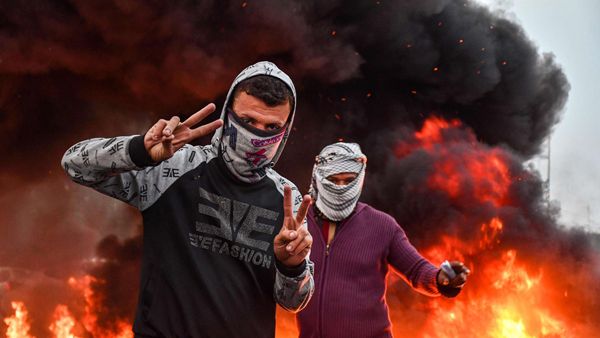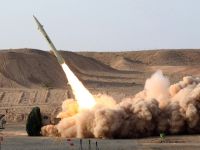Demonstrations that Iraqi Shia cleric Moqtada al-Sadr hoped would serve as a “popular referendum” backing his movement’s ambitions to form a government after the next elections have dealt a big blow to him and his movement.
The protests have brought bad publicity to him and estranged him from a large swathe of the Shia street in Iraq.
To make matters worse, signs of a rift within the Sadrist movement have emerged, with the announcement by one of its factions that the movement no longer represents them and does not meet their aspirations for reform after its suspected involvement in the shedding the blood of demonstrators who are not affiliated with it in the city of Nasiriyah, the centre of Dhi Qar governorate in southern Iraq.
?"The word 'jokeriyya,' which can be translated as jokerdom or jokership entered the Iraqi public sphere to evoke a host of tropes..."@ussakizade on the image of The Joker in Iraq's October Revolution in our new "Global Protest Movements in 2019" serieshttps://t.co/RW52iXp8Wf pic.twitter.com/TRkQGAJm2j
— Society for Cultural Anthropology (@culanth) November 27, 2020
Last Friday, Sadr’s supporters came out in massive demonstrations in support of their leader’s decision to backtrack on his previous decision not to participate in early parliamentary elections scheduled for next summer. Sadr’s pretext was that he wanted an opportunity to fix Iraq’s poor conditions by having his movement lead the next government. The Sadrists, however, did not like the presence of other demonstrators not affiliated with their movement in the city of Nasiriyah, one of the largest centres of the October uprising that began in the fall of 2019 and led to the fall of former Prime Minister Adel Abdul-Mahdi’s government and the approval of early parliamentary elections to reconfigure the legislative and executive authorities.
Sadr’s supporters engaged in violent acts against protesters in Haboubi Square in Nasiriyah, resulting in the death of at least seven people, some of whom were shot, and the injury of eighty others. These acts sparked a massive wave of anger against Sadr that has spread to within his own movement.
Dissident groups
Iraqi activists circulated on social media a document attributed to a movement calling itself Supporters of the Sadrist Reformist Movement (referring to Moqtada’s father), decrying “contradictory stances, duplicity, clear violation of Mohamed al-Sadr’s approach, and the pursuit of spoils and deals under the cover of reform.”
The movement announced it was breaking away from Moqtada al-Sadr’s command and that they were no longer bound to obey his orders, citing the storming of Haboubi Square and the suspected killing of demonstrators in cold blood by members of the Peace Brigades, the armed Sadrist militia. They also decried the direct incitement against the demonstrators on the Twitter page of the leader of the Sadrist movement, which bears the pseudonym Saleh Mohamed al-Iraqi. The dissident movement’s statement said that the demonstrators’ major crime was that “Moqtada was annoyed by their chants.”
A second dissident group calling itself “The Gathering of the Sons of the Holy Mawla (Mohamed al-Sadr) in the Governorates of Maysan, Nasiriyah, Basra and Baghdad,” published a document declaring they rejected Moqtada al-Sadr’s orders and were “no longer bound to obey him from now on.”
The same said the leader of the Sadrist movement has made many mistakes and and that his about-turns and violations are increasing, in reference to him breaking his pledge not to participate in the elections.
However, the Sadrist movement denied through its spokesperson the existence of these splinter groups, saying that their statements are false and are part of a psychological war being waged against the movement.
Those familiar with Iraqi affairs say that Moqtada al-Sadr resents participants of the October uprising because they directed some of their anger towards him, declaring him and his movement to be part of an existing system of corruption, waste and incompetence.
The leader of the Sadrist movement has often tried to market himself as an exception to other leaders and politicians who have led Iraq since 2003, portraying himself as a reformist leader. But that image is contested by many Iraqis, who point to his use of ministers and administrators affiliated with him and his movement, as well as his defence of the regime during the latest uprising. They also point out that Sadr at first tried to infiltrate the protest movement and gain control of it from the inside, and when that failed, used his Blue Berets militia, which was involved in acts of violence against protesters, to put down the protest movement.
Ironically, in the recent demonstrations organised by his supporters, Sadr tried to monopolise the street, but failed to do so and was unable to silence the strong anti-Sadrist popular current that took to the streets in Nasiriyah, which tore up his pictures and chanted particularly harsh slogans against him, including “There is no god but Allah, and Moqtada is Allah’s enemy.”
Losing control
Among the adverse consequences of the Friday demonstrations on the Sadrist movement is their demonstration of Sadr’s inability to control the movement of the street, an ability he often claimed to possess and used as a bargaining chip with opponents and rivals whenever demonstrations and protests escalated and posed a threat to the regime led by these rivals and opponents looking for a way to protect their interests from the anger of the street.
Following Friday’s events, Sadr called on protesters in Nasiriyah to put an end to their protests and sit-ins, but they defied him after the wave of repression against them by his followers and armed members of his militia and returned to the streets again, raising their anti-Moqtada al-Sadr slogans.
Sadr’s political opponents from within the circle of Shia parties and currents to which he belongs found in his clash with the street an easy opportunity to attack him and attempt to exclude him from the scene.
The Victory coalition led by former Prime Minister Haider al-Abadi rejected what it called “political and societal clashes,” calling on the government of Prime Minister Mustafa al-Kadhimi to exercise its responsibilities.
Sadr exerted significant pressure on Abadi and his government during the latter’s term as prime minister from 2014-2018, joining the large anti-government demonstrations of the time and mobilising his supporters to help storm the Green Zone and ransack the headquarters of the House of Representatives in April 2016.
Sadr has always played a double game in Iraqi politics. He has always insisted on having his movement participate in the various governments while also keeping a foot in the opposition, enabling him to evade taking a share of the blame for the failure of each government and corruption, in order to preserve whatever balance in popular support he has had.
This article has been adapted from its original source.








